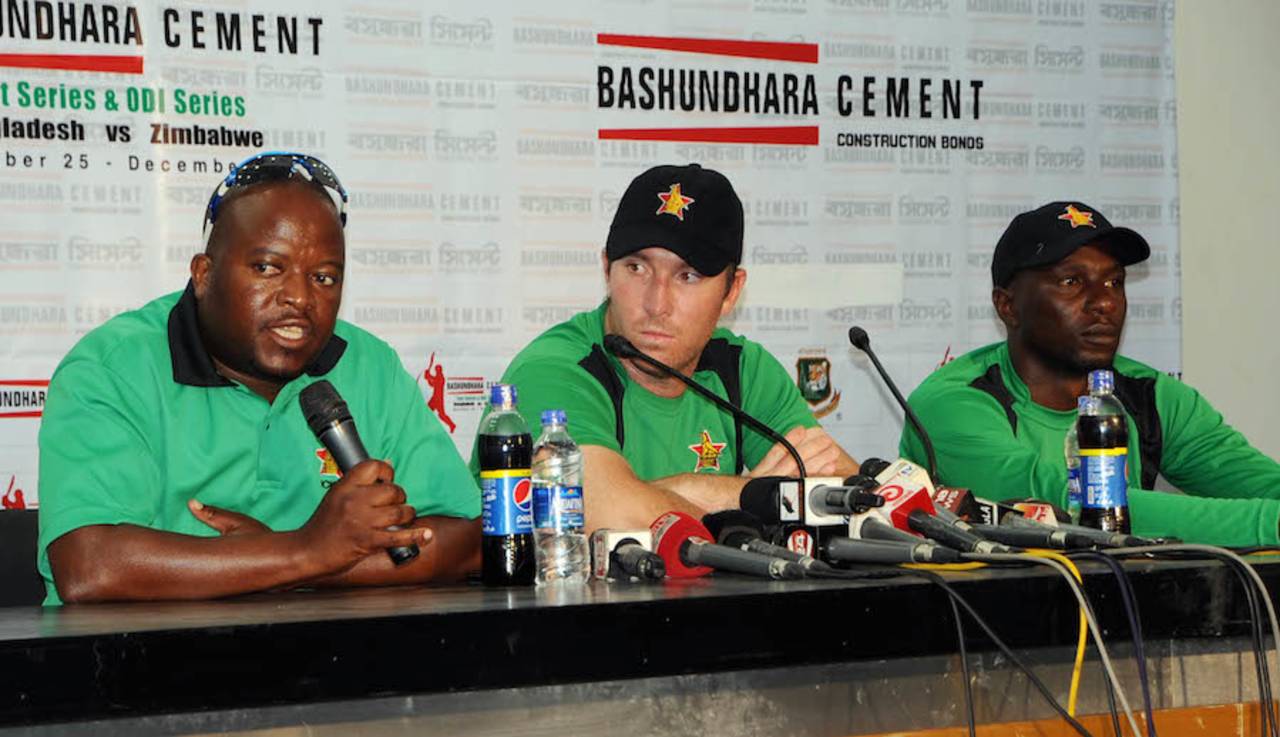Zimbabwe plan for life after Taylor, Masakadza
Stephen Mangongo, Zimbabwe's Under-19 coach, hopes about five players from the youth team graduate to the senior team and also help revive schools cricket in the country
Shashank Kishore in Mount Maunganui
19-Jan-2018

BCB
Zimbabwe Cricket has already begun their succession plan for life after Brendan Taylor (31) and Hamilton Masakadza (34), two of their most senior cricketers who are now in their thirties. With matches, tournaments, funding and sponsorship hard to come by, the coaches and management are going all out to get Zimbabwe nationals playing a competitive level of cricket in other countries, particularly at the Under-19 level to begin with.
"The main challenge is our school system, which we always rely on to tap on talent. The level of cricket has gone down because they play just seven 50-over games the whole year," Stephen Mangongo, Zimbabwe's Under-19 coach, said. "There's no two-day or three-day games, nothing. That scenario is not ideal. You cannot produce international cricketers in such a system. That is the biggest challenge."
Among those in the current Under-19 squad to have played abroad are: Donald Mlambo, who studies in England and has been scoring heaps of runs for a Suffolk-based club, Alistair Frost, an offspinner who plays for Hilton College in South Africa, Tinashe Nenhunzi, who plays in Durban, and Taun Harrison, who has been performing well at the school level in Cape Town. Wesley Madhevere, who also plays in South Africa, is now in his second World Cup after debuting in Bangladesh as a 15-year old.
Often it is the lack of exposure that has driven talent away, a harsh reality in troubled times. "From Zimbabwe, because of lack of enough cricket, talented youngsters move to South Africa where they play a minimum of 50 games in a year," Mangongo said. "Some play in England for the same reason. However, they're still Zimbabweans. Hamilton Masakadza and Brendan Taylor are in their mid-30s. They aren't going to be there for long. It is Zimbabwe Cricket's duty to identify players now, so that they can graduate to international cricket in the next three-four years. It is a sustained program to go into South African schools and identify Zimbabweans."
While Mangongo is keen on working on bringing back overseas talent, he's also mindful of the frustration cricketers endure from within because of lack of exposure in a struggling financial environment in Zimbabwe. It's an area he hopes Zimbabwe Cricket will be able to address quickly. "It's a massive challenge, we can't hide that fact," he said. "It's difficult. A talented cricketer wants to play enough cricket. If they come back and don't play first-class or for Zimbabwe A, youngsters will look elsewhere. Zimbabwe Cricket is trying to ensure there's enough A cricket or first-class cricket so talented youngsters realise their dream. Talent is there, though.

ICC/Getty Images
"Funds, matches being cancelled are all genuine fears players have. All these challenges of staging and hosting, it becomes a big irritation for any serious cricketer. Their job is to play, evolve and move to the next stage. The stop-start becomes a real threat to serious cricketers but I'm sure Zimbabwe Cricket is trying its level best. Brendan Taylor or Kyle Jarvis woudn't come back if cricket in the country wasn't on a revival part. They had good contracts in England. Within the next three-four years, we want cricket to become sustainable."
In recent times, though, there has been an upswing in fortunes of the game in Zimbabwe. Mangongo particularly stresses on how Taylor's return has spelt new hope, even as the board is slowly picking up the pieces under a revamped structure and administration.
"His return is a show of confidence. It's a massive indicator to a lot of youngsters who have grown up idolising Taylor," he said "It also tells the youngsters that 'wow, Brendan is back. It gives me hope to continue playing cricket'. Because if a seasoned player can make a decision to come back and play for Zimbabwe, then the youngsters who want to dream, who want to play cricket seriously in the country, they start to believe in themselves that it can be done."
In that regard, having a number of players return ahead of the Under-19 World Cup is a victory in itself, according to the coach. But he's aware of the need to ensure these players become the fulcrum of their plans over the next four-five years. He not only hopes four or five of them graduate to the national team but wants to use them to ensure schools cricket is revived again in the country.
"As a coach, coming from where Zimbabwean schoolboy cricket is; it's in the gutter to be honest," Mangongo said. "We've got really about five schools that are serious cricketing schools. To then come to international youth level and rubbing shoulders with quality cricketers is a challenge. Youth cricketers are ruthless. They're not playing for money. They're playing to perform. That's all they want to do. They play hard, they tough. So, for us this Under-19 World Cup is a massive jump."
Shashank Kishore is a senior sub-editor at ESPNcricinfo